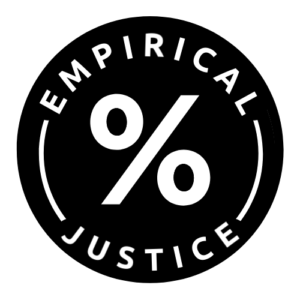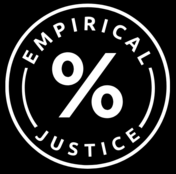EMPIRICAL JUSTICE
Over 90% of federal defendants plead guilty; over 83% who go to trial are convicted.
We’ll give you the tools to convince a judge to reject a Guidelines sentence.
Over 90% of federal defendants plead guilty; over 83% who go to trial are convicted.
We’ll give you the tools to convince a judge to reject a Guidelines sentence.
Empirical Justice can enhance your advocacy with statistics on your client’s exact position on the Sentencing Table, and with thousands of comparable cases “hidden” from standard legal search engines.
Empirical Justice partners with defense lawyers on U.S. federal criminal cases. (Not cases charged in state courts.)
Research focused on your client’s particular case: statistical analysis of your client’s Guideline and exact position on the Sentencing Table; reports identifying comparable and favorable cases that cannot be located with standard legal search engines; and declarations by statisticians that are suitable for admission in court.
We are also delighted to provide additional services, but please note that Empirical Justice is not a law firm. Our founder and C.E.O., Michael Yaeger, is available to provide legal services, such as drafting briefs for sentencing or appeal, through the law firm where he is a shareholder (partner), Carlton Fields.
We use the official datasets collected by the U.S. Sentencing Commission each year. There are over 1.2 million cases in the total dataset.
The basic information we need is the district court, the sentencing judge, and the Guidelines calculation.
The Guidelines calculation should include the Chapter 2 subject matter Guideline (example: USSG § 2B1.1), the criminal history category, and the final offense level after any deductions for acceptance of responsibility.
It’s also good to give us a copy of the charging instrument (the indictment, information, or criminal complaint), a plea agreement or Pimentel letter if there is one, plus a paragraph briefly outlining any other facts you think are relevant.

We make it easy for you to teach the court by providing visualizations and a written declaration from a statistician as a standard part of our service.
Consider a defendant convicted of a fraud under USSG § 2B1.1, with offense level 17 and criminal history category I. The Guidelines range for such a defendant is 24-30 months. But we found that, from 2014-2018, the actual median sentence was approximately 12 months. You can see this in the image below.
In other words, 50% of those defendants received a sentence that was only half of the Guidelines range, or even less. Further, about 68% of those defendants are under the Guidelines range. The blue highlighted area to the left of the graph demonstrates these defendents.
Defense lawyers who can show data like that have the powerful argument that their clients should be treated the same as the overwhelming majority of similar defendants.
Lawyers can also persuade judges to reject the Guidelines with individual precedents: cases of similarly situated defendants who received non-Guidelines sentences. The problem is finding the cases when you don’t already know about them.
Standard legal search engines aren’t much help because the overwhelming majority of sentences are imposed without a written opinion.
The Sentencing Commission’s dataset doesn’t supply an answer, either, because the Commission deliberately de-identifies the cases it collects. It strips out the names of cases and judges, and creates completely new identification numbers for cases. It even cuts out the individual day on which a defendant is sentenced, leaving just the month and year.
But there are ways to re-identify cases—at Empirical Justice, we’ve put together a collection of hundreds of thousands of re-identified cases. That gives lawyers a means for convincing judges that is both new and comfortingly familiar to courts.
When a lawyer provides a sentencing judge with summaries of apposite precedents complete with case names, case numbers, and the names of the deciding judges, the lawyer gives the judge back his natural strength. Nothing is more natural to a common law practitioner than looking to precedent and reasoning by analogy.
Re-identified cases allow lawyers to go further than the categories that the Commission chooses to collect and code, giving judges an even stronger sense that a non-Guidelines sentence is appropriate.
If you would like to learn more about Empirical Justice, have questions, or just would like to communicate with our leadership, please use the button below to begin filling out a contact form to reach us quickly. You can also leave a voicemail at 347.201.2216. We try to respond within 24-48 hours.
